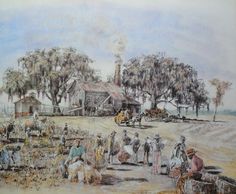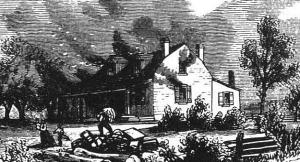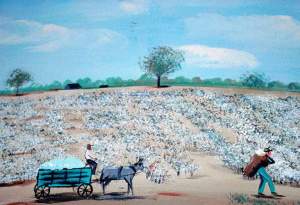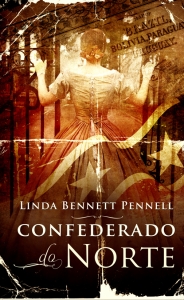A Desertion Most Personal
One hundred fifty years ago the Confederate States of America’s brief existence came to an end after four years of bloodshed. Her people were left to wonder what would become of them, especially the women and children who had so little control over their own lives. As authors of historical fiction, we at History Imagined create our own interpretations of what it might have been like to live in a different era. What follows is an imagined interview with the fictional heroine of my Reconstruction era novel, Confederado do Norte. Please join me in a glimpse of what her life once was and then how it became.
LBP: Would you introduce yourself and tell us where you were born?
MC: My name is Mary Catherine MacDonald Dias Oliveira Atwell. I was born January 1, 1857 in Washington County, Georgia on a farm overlooking the Oconee River.
LBP: In your memoir, Confederado do Norte, you tell us a great deal about your life in Brazil, but you say very little about your life in Georgia. You were quite small when the Civil War began. Do you have any memories of life before the war?
MC: I have a few, but really it’s difficult to remember that there was ever a time before the war. That period for me is only impressions and shadows because they are my very earliest memories.
LBP: Would you mind sharing what you do remember?
MC: I suspect my recollections are, as is the custom with very young children, somewhat mixed up and jumbled together. Nevertheless, I will do my best to explain how it once was and then how it became.
During my earliest years I was happy and I had no fear of the future, for young children are blessedly unaware that terrible things can happen in their small, secure worlds. My parents and I lived in a comfortable home and enjoyed the company of neighbors and family within its walls. We were kin, in one way or another, to most of the white people in the county, which is not surprising considering that is was a very rural area. Also not surprising, Papa was catered to by all of our female relatives, especially his old maid sisters, for you see, ours was a supremely patriarchal society.
LBP: You have mentioned your home in Georgia. Do you have any special memories of it?
MC: When I picture “home”, I see an unpainted dogtrot farmhouse that wouldn’t have been terribly grand by most people’s lights. It exists now only in shadowy visions: cotton fields stretching from the edge of a deep porch down to the river, flashes of a sunbeam dancing on the lemon oiled surface of Mama’s best table, tall windows and high ceilings. It’s all really rather vague, but I do have a clear memory of Mama’s garden. It is of her favorite rose bush to which I did some considerable damage one spring by picking off all the buds before they even broke color and for which I was spanked rather severely.
LBP: As Southerners, did your family own slaves?
MC:  It pains me to tell you that, yes, my beloved Papa participated in the evil of slavery. However, it should be understood that my home was a farm rather than a large plantation. There were only a few Coloreds on the farm, most of whom worked in the fields. While it does not exonerate him, I can tell you with certainty that Papa did not beat or ill-treat the slaves. I suppose they were as content as anyone could have been, trapped as they were in such circumstances. I do not remember any unrest on the farm, but perhaps I was simply shielded from it.
It pains me to tell you that, yes, my beloved Papa participated in the evil of slavery. However, it should be understood that my home was a farm rather than a large plantation. There were only a few Coloreds on the farm, most of whom worked in the fields. While it does not exonerate him, I can tell you with certainty that Papa did not beat or ill-treat the slaves. I suppose they were as content as anyone could have been, trapped as they were in such circumstances. I do not remember any unrest on the farm, but perhaps I was simply shielded from it.
Of their faces, it is only Bess’s that has stayed with me into old age. My Bess, who lived in the house, and who took care of me, and whom I loved as much as I did my parents. As was the custom, I was reared more by Bess than by Mama and Papa. It was simply the way of things.
LBP: I see. What do you remember of your parents?
MC: My clearest memories of my parents are that Papa spent his days with the field hands
 and that Mama loved music. She was an accomplished pianist. Beautiful music filled the house when she played her pianoforte in the parlor. Sometimes when Bess brought me in to say goodnight, Papa would be sitting beside Mama, kissing her neck as she played and she would be smiling at him in the special way that she reserved only for him. I think they must have been very happy. They laughed a lot in those days. Then, the war came.
and that Mama loved music. She was an accomplished pianist. Beautiful music filled the house when she played her pianoforte in the parlor. Sometimes when Bess brought me in to say goodnight, Papa would be sitting beside Mama, kissing her neck as she played and she would be smiling at him in the special way that she reserved only for him. I think they must have been very happy. They laughed a lot in those days. Then, the war came.
LBP: Forgive me for asking what may be a painful question, but what do you remember of the war?
MC: Yes, it is still painful after all this time, but I will try to answer as best I can. This was how time was marked with our people: before the war and then after.
Most of my memories from the war are thankfully not all that clear. It may also be that I have deliberately locked them away in my mind’s deepest recesses. It was a dreadful time. I do remember Mama crying a lot and staring at the small tintype of Papa in his uniform. She read and reread his treasured, but infrequent letters. I know that I often cried myself to sleep at night because I missed my adored papa so much. Toward the end we were hungry all the time because there simply wasn’t anything left to eat. Mama became so thin that Bess fumed and declared that someone would be made to pay for visiting all this trouble upon us, but how this was to be accomplished was unclear since we were just females left to fend for ourselves.
The extent of our defenselessness was resoundingly brought home to us in late November 1864. Although my war memories may be sketchy in some ways, frightening clarity surrounds the arrival of Sherman’s soldiers on their relentless March to the Sea. Even now their shouts and snarling faces haunt my dreams. Some nights I’m disturbed with nightmares of choking on the  acrid smoke of our burning home, trying not to reveal our position with coughing, and of the milk cow’s terrified bawling as she was consumed in the barn’s inferno. Mama, Bess, and I hid in the woods down by the river while those men stole everything that wasn’t nailed down and set fire to what they couldn’t carry off.
acrid smoke of our burning home, trying not to reveal our position with coughing, and of the milk cow’s terrified bawling as she was consumed in the barn’s inferno. Mama, Bess, and I hid in the woods down by the river while those men stole everything that wasn’t nailed down and set fire to what they couldn’t carry off.
LBP: It must have been a very difficult time. With your home burned, where did you find shelter?
MC: After the ashes cooled, Bess found a few pieces of tin and repaired the damaged roof over the kitchen, the only building not completely destroyed. We stayed there and made do as best we could. Bess begged Mama to move into town where Papa’s spinster sisters had a small house, but Mama insisted that we couldn’t leave the farm because Papa would expect to find us there.
LBP: What was it like when the war finally ended?
MC: Some six or seven months after Sherman’s March, Papa came home. It was the summer of 1865. I was just a child, but even then I knew that life as we had known it was over forever.
This is where the fabric of my life increases in its complexity. The texture becomes richer and the pattern becomes more intricate. In unraveling the threads, I hoped they could be rewoven into a firmer, more solid whole – one without the holes and ragged edges that marred it. This examination became the fibers of my memoir.
At first, I wasn’t sure that it was my papa who had returned to us. It wasn’t just the difference between my five-year-old memories of him and the perceptions of a more grown up girl of nine. He’d become someone I simply couldn’t recognize. His uniform, in which he had once taken such pride, was tattered and filthy. His skin seemed to fold loosely over his tall frame and his eyes were so sunken that his once handsome face had taken on the appearance of a death mask. But the thing that frightened me most was that he didn’t speak to us, not even when Mama cried and begged him to tell her how she could help. By day, he spent most of his time alone simply walking the fields that had once been so productive. He wept at night when I suppose he thought no one could hear him, but why he thought he couldn’t be heard is beyond me, for all of us slept in the same cramped space. And sometimes he cried out in his sleep as though he was still off fighting.
There came a time when he drifted into a phase of almost complete inertia, and for a while, we feared for his sanity. He refused to be roused from his bed despite all of our efforts. He would just stare at Mama and get a strange look in his eyes when she pleaded with him. I wasn’t supposed to know that Mama and Bess thought he might completely lose his mind, but it didn’t take medical training or age to see the vacant stares and hear him in the night.
Gradually, to everyone’s relief, he got a grip on himself, which was worse in many ways because of the rage that replaced the vacant expression in his eyes. I remember avoiding my father, whom I had always adored, but around whom I became cautious. His mercurial nature was confusing and frightening, not unlike the political environment in which we found ourselves living.
LBP: Can you describe that environment?
MC: The Confederacy had lost the war and wherever her people gathered, they discussed the only topic on anyone’s mind – the horrors of armed occupation. Can you fathom it? People who started a war never stopped to think about the possibility of defeat. A former enemy in charge of the local and state governments was simply something no one had ever conceived possible. Even now, it boggles the mind that they could have been so . . . Oh my goodness, I nearly called my people stupid. Gently brought up Southern ladies would never use so vulgar a term. Perhaps the word misguided is acceptable?
LBP: You seem to harbor some resentment.
MC: I do, even after all these years. I apologize for letting it show. Bess would have boxed my ears for such unladylike behavior.
LBP: It is understandable. No apologies are needed. Getting back to our subject, what do you think ultimately persuaded your father to leave Georgia for Brazil’s primitive interior?
MC: During times of turmoil, some people cling to anything familiar because it provides a feeling of normalcy, however tenuous. Others seek a different path. Papa and my mother’s eldest brother Nathan, the only men left alive on either side of our family, decided that there was only one response to the unendurable. Like a small number of people from across the region, they ignored the pleas of our former leaders like General Robert E. Lee, and turned their eyes toward a very distant south.
LBP: And how did you feel about this?
MC: I didn’t care who was in charge of the government or how ruined everything was. Georgia was home. It was where my family came from as far back as the American Revolution. But most important, it was where my beloved Bess was. I never got over being separated from the woman who had been the rock in my life since birth. Deserting the only home any of us had ever known and running away to Brazil in the end solved nothing.
LBP: Looking back from the perspective of adulthood, what is your opinion of the war’s validity?
MC: I loved my parents and my people, but they were wrong both before and after the war. Slavery was a cruel and most unChristian institution. Even as a child, I recognized the hypocrisy of being told to love my neighbor as myself on Sunday, then treat my neighbors of color in the most terrible way imaginable the rest of the week. It was an indefensible dichotomy. Ultimately, the South’s defeat was the best thing that could have happened for all concerned.
LBP: Thank you for sharing your thoughts with us. We wish you well and hope that writing your memoir has provided the solace you sought.
The fictional memoir, Confederado do Norte, can be found on Amazon. http://amzn.com/B00LMN5OMI
Confederado do Norte tells the story of Mary Catherine MacDonald Dias Oliveira Atwell, a child torn from her war devastated home in Georgia and thrust into the primitive Brazilian interior where the young woman she becomes must learn to recreate herself in order to survive.




This is amazing! For a history buff like myself, it is one I just have to read. Thank you for such an iteresting bog.
LikeLiked by 1 person
Thank you, LouAnn! I am so glad you enjoyed this “prequel” to Confederado do Norte!
LikeLike
Having lived my life, and received my education, in the North, I had only a vague idea of what life in the South after the Civil War was like. Confederado Du Norte opened my eyes to a whole different perspective. I highly recommend it.
LikeLiked by 1 person
Hi Becky. You are not the first friend who grew up in the North to say this. I suppose high school teachers and college professors in the South during my school days dwelt more on all facets of the Civil War because the majority of it was fought on our soil. Reconstruction was analyzed and dissected as well. Personally, I believe the war had to be fought to determine who and what we are as a people and as a nation. Some historians believed that slavery would have fallen of its own weight and an argument can be made that the war began over states’ rights vs federal power. One can argue that Lincoln was calculating and manipulative in the manner and timing of issuing the Emancipation Proclamation, but in the long run, the Civil War is what rid us once and for all of the evil of slavery. With that in mind, it was worth all the bloodshed and grief.
LikeLike
I lived in Atlanta in 1958 and 1959, part of the influx of northern invaders. Here the civil war lingered. My classrooms featured framed photos of Robert E Lee. We re fought and argued battles in Advanced English class. I did not read Gone With the Wind until I left Atlanta. I love your writing, Linda.. It’s so memorable and evocative. But I really hate the civil war. I hope you write one about the American Revolution. That I will read eagerly. Did you ever read Elswyth Thane? You might enjoy here.
LikeLiked by 1 person
I understand your position, Susan. Thank you for commenting and your kind words! You are so right about the Civil War lingering in the South! Actually, I have thought about writing something set during the 18th century. That book, however, is still rather formless. Scotland and Frasers may be featured. It’s hard to say at this point.
LikeLike
Interesting, but sad. Good luck on your historical, Linda.
Emma Lane
LikeLiked by 1 person
It was a tragic time, I agree. I have been told that there is a touch of the literary about this novel. Would it help if I told you that there is an HEA for the novel?
LikeLike
How well written! I am sure it was more horrible time than any of us could truly imagine. War is never pretty, and hurts both sides equally.
LikeLike
Thank you, Susabelle. William T.Sherman was telling a very personal truth when he said, “War is Hell!” He visited hell on Georgia so that the greater good would triumph.
LikeLike